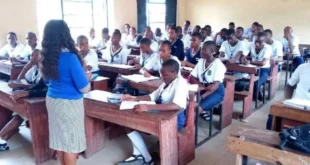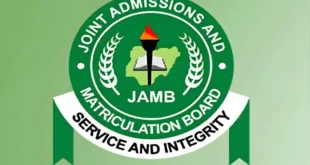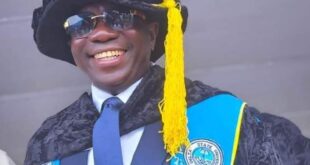By Funmilayo Adeyemi
When the All Progressives Congress (APC) Government came into office in 2015, President Muhammadu Buhari appointed Malam Adamu Adamu as minister of education with 35 others.
Adamu, after completing four years of his first tenure, was reappointed on Aug. 21, 2019 after the re-election of President Buhari for a second term.
While Adamu was reappointed as the education minister, Chukwuemeka Nwajiuba was appointed his counterpart as the minister of state. The duo appeared to have had a clear idea of what they wanted to do for the country in the education sector.
During the minister’s first tenure in office, he made some promises on stabilising the sector and these promises were contained in the Ministerial Strategic Plan (MSP) (2016-2019), many of which he was, however, unable to fulfill.
In his second tenure, he expanded the ministerial strategic plan blueprint tagged: ‘A Ministerial Strategic Plan (MSP) (2018 – 2022)’ titled: ‘Education for Change’ which was developed to address the challenges confronting the sector.
The plan was anchored on 10 pillars, namely: Out- of- School-Children, Youth and Adult Literacy, Science, Technology and Engineering, Basic and secondary education and Library Services.
Others are: Teacher education and capacity building, Tertiary education, Curriculum and policy matters, Education Data and planning, and Information and communication Technology.
Some of the promises in the MSP targeted reduction of out-of- school children by enrolling 2,875,500 children in schools annually for three years; strengthening basic and secondary education, promotion of community schools; removal of every form of payment (levies) in basic schools, among others.
Adamu-led team placed high premium on education policy, data and planning. These were to address the issue of curriculum, especially as it bordered on the Christian religious knowledge (CRK) and the Islamic religious knowledge(IRK) which were subsumed into civic education.
The administration took this bold decision, considering the fact that religious studies are very crucial to the moral development of children, hence; the two subjects were separated as CRK and IRK which returned as different subjects.
Also, taking cognisance of the significance of History as a subject, it was separated from Social Studies at the basic level and now stands alone.
The ministry was also able to develop a safe school declaration policy for schools, developed a National Language Policy in respect of the diversity and vitality of Nigerian languages as well as successfully developed new minimum standards for the National Certificate of Education (NCE).
Similarly, the review of the university accreditation instruments and manual with a view to improving the efficiency and effectiveness of accreditation of programmes and the review of Benchmark Minimum Academic Standards (BMAS) and the university quality Assurance were put in place.
The ministry, through the Teacher Registration Council of Nigeria (TRCN) recorded remarkable achievements in the professionalisation of the teaching profession through Teacher Professional Registration and Examination to check quackery in the teaching profession.
At the 2020 World Teachers Day ceremony, the minister had announced a special salary scale for teachers in addition to a new retirement age. He promised to ensure that the Federal Government implements its commitment to the endorsement of Safe Schools Declaration and remove 13.2 million out-of-school children from the streets in the next five years.
One of Adamu’s notable achievements was also a directive to secure funding of N220 billion grants from the World Bank to tackle the problem of out-of-school children, while also putting in place a free-learning platform called ‘inspire.education.gov.ng’ for continuing learning during the COVID-19 pandemic.
Also, during his tenure, there were perceived reduction in examination malpractices in schools across the country. This was achieved through several initiatives of infusing technology into the conduct of examinations by the National Examination Council (NECO), Joint Admissions and Matriculation Board (JAMB) and others.
In spite of some of these achievements, the minister was not been able to stem some tide, resulting to unsuccessful delivery of a number of programmes.
For example, the new teachers salary as promised has not been met, but teachers tenure of service had been increased from 60 years to 65 years.
The 2018 personnel audit by the Universal Basic Education Commission (UBEC) showed that over 300,000 teachers in Nigeria are unqualified as they do not possess the prescribed minimum qualifications for teaching. Many of them were said not to be educationally equipped to undertake the job of impacting knowledge.
The minister was also unable to put an end to the lingering strike actions in the Nigerian tertiary education system, forcing students to be at home for more than eight months.
Also, the issue of out-of-school children remains a big challenge which the minister could not resolve in his eight years as the long-serving minister of education in Nigeria’s history.
According to a Demographic Health Survey (DHS) conducted in 2015 by UNICEF and the Nigerian Government, there were 13.2 million out-of-school children in Nigeria.
As of 2022- seven years after, UNICEF reported that the figure had risen to 18.5 million children, which is the highest in sub-Saharan Africa.
The major failures in the sector resulted from inadequate funding of the sector as the funds allocated to education were low against the stipulated 15 to 20 per cent proposed by UNESCO.
This is because only 6.7 per cent of the 2020 budget was allocated to the sector, a figure not enough to tackle the challenges in the sector.
In 2022, at the 66th Meeting of the National Council on Education (NCE) held in Abuja, Adamu expressed disappointment with himself that after 7 years in office, he was unable to put an end to the out-of-school children menace.
He said that reducing out-of-school number had remained a priority to him ever since he first got into office.
Adamu said that the problem was a direct result of the insecurity in the nation in parts; as well as the weak resolve of the state governments.
He said: “Seven years ago, when I became Minister, I made it (out-of-school-children challenge) my priority and up till this moment, it is my priority.
“I recently received a phone call from one of our elders where he informed me that I am now the longest-serving Minister of Education.
‘’I didn’t know and I didn’t really care because the only thing that worried me was that I came into office with the resolve to remove out-of-school children and I have failed, so for 7 years I have been unable to do this.”
The minister explained that he had made attempts to encourage the state governments to declare a state-of-emergency in the primary education sector as a result of the number of out-of-school children; but it had still not been implemented.
Experts have however argued that the huge decline in the education sector could be fixed if stakeholders come together to collectively tackle the challenges bedeviling the sector.
Mrs Adejoke Adefulire, Senior Special Adviser to the President on Sustainable Development Goals (SDGs) at the commemoration of the International Day of Education, said the inclusive and equitable quality education and lifelong learning for all was central to the achievement of all the other 16 SDGs.
Adefulire noted that government had taken strategic steps to promote quality and inclusive education in the country, but this needed collective engagement.
“Undoubtedly, education holds the key to unlocking the huge potentials of people on the planet. More specifically, learning can empower people, build shared prosperity, foster peace and preserve the planet.
“We must do everything humanly and politically possible and every support, partnership that we can gather to ensure that all our children all over Nigeria in the rural communities, in the riverine areas, in the cities, everywhere in Nigeria must return to schools,” she said.
Also, the UNESCO Regional Director in Nigeria, Ydo Yao, had called on Nigerian government to address the education and learning crises confronting the sector.
Yao said there was need for a collective responsibility to ensure the country get all out-of-school Nigerian children back to school.
He, therefore, called for urgent action, not only in ensuring that the out-of-school children were returned to school; but also ensuring quality learning outcomes.
(NANFeature)
Subscribe to the Advocate News letter and receive news updates daily in your inbox.
 Advocate.ng Latest news update on politics, entertainment, sport and more
Advocate.ng Latest news update on politics, entertainment, sport and more




